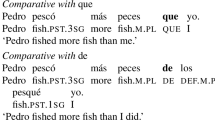Abstract
The sentence Irving was closer to me than he was to most of the others contains a quantifier, most of the other, in the scope a comparative. The first part of this paper explains the challenges presented by such cases to existing approaches to the semantics of the comparative. The second part presents a new analysis of comparatives based on intervals rather than points on a scale. This innovation is analogized to the move from moments to intervals in tense semantics. The remainder of the paper is concerned with an interval-based semantics of degree in relation to issues other than the comparative proper. The paper begins with a discussion of the role negative polarity has played in studies on the semantics of comparatives.
Similar content being viewed by others
REFERENCES
Bennett, M.: 1977, 'A Guide to the Logic of Tense and Aspect in English', Logique et Analyse 80, 491-517.
Bennett, M. and B. Partee: 1972, 'Toward the Logic of Tense and Aspect in English', Systems Development Corporation, Santa Monica.
Bierwisch, M.: 1987, 'The Semantics of Gradation', in M. Bierwisch and E. Lang (eds.), Dimensional Adjectives, pp. 71-262. Springer-Verlag, Berlin.
Cresswell, M. J.: 1976, 'The Semantics of Degree', in B. Partee (ed.), Montague Grammar, pp. 261-292. Academic Press, New York.
Cresswell, M. J.: 1985, Adverbial Modification. Interval Semantics and Its Rivals (Studies in Linguistics and Philosophy 28). Reidel, Dordrecht.
Ehrenkranz, J.: 1973, 'Sometimes, Or = And', Linguistic Inquiry 4(2), 241-242.
Fauconnier, G.: 1975, 'Polarity and the Scale Principle', Papers from the Eleventh Regional Meeting of the Chicago Linguistics Society, pp. 188-199. CLS, Chicago.
Fauconnier, G.: 1978, 'Implication Reversal in Natural Language', in F. Guenthner and S. J. Schmidt (eds.), Formal Semantics and Pragmatics for Natural Language, pp. 289-301. Reidel, Dordrecht.
Heim, I.: 1985, 'Notes on Comparatives and Related Matters', ms., University of Texas at Austin.
Hellan, L.: 1981, Towards an Integrated Analysis of Comparatives. Narr, Tübingen.
Heycock, C. and A. Kroch: 1999, 'Pseudocleft Connectedness: Implications for the LF Interface Level', Linguistic Inquiry 30(3), 365-397.
Higgins, F. R.: 1973, The Pseudo-Cleft Construction in English, PhD dissertation, MIT. Published by Garland, New York, 1979.
Hoeksema, J.: 1983, 'Negative Polarity and the Comparative', Natural Language and Linguistic Theory 1(3), 403-434.
Hoeksema, J.: 2000, 'Negative Polarity Items: Triggering, Scope and C-Command', in L. Horn and Y. Kato (eds.), Negation and Polarity. Semantic and Syntactic Perspectives, pp. 123-154. Oxford University Press, Oxford.
Kadmon, N.: 1987, On Unique and Non-Unique Reference and Asymmetric Quantification, PhD dissertation, University of Massachusetts at Amherst.
Kennedy, C.: 1997, Projecting the Adjective: The Syntax and Semantics of Gradability, PhD dissertation, UC Santa Cruz.
Kennedy, C.: 1999, 'Local Dependencies in Comparative Deletion', K. Shahin, S. Blake, and E.-S. Kim (eds.), Proceedings of WCCFL 17, CSLI Publications, Stanford.
Kennedy, C.: 2001, 'Polar Opposition and the Ontology of Degrees', Linguistics and Philosophy 24(1), 33-70.
Klein, E.: 1980, 'A Semantics for Positive and Comparative Adjectives', Linguistics and Philosophy 4, 1-45.
Klein, E.: 1982, 'The Interpretation of Adjectival Comparatives', Journal of Linguistics 18, 113-136.
Klein, E.: 1991, 'Comparatives', in A. von Stechow and D. Wunderlich (eds.), Semantik/Semantics. An International Handbook of Contemporary Research, pp. 673-691. De Gruyter, Berlin.
Ladusaw, W. A.: 1979, Polarity Sensitivity as Inherent Scope Relations, PhD dissertation, University of Texas at Austin.
Ladusaw, W. A.: 1980, 'On the Notion of Affective in the Analysis of Negative Polarity Items', Journal of Linguistic Research 1, 1-23.
Lakoff, G.: 1971, 'On Generative Semantics', in D. Steinberg and L. Jakobovits (eds.), Semantics: An Interdisciplinary Reader in Philosophy, Linguistics and Psychology, pp. 232-296. Cambridge University Press, Cambridge.
Larson, R.: 1988, 'Scope and Comparatives', Linguistics and Philosophy 11(1), 1-26.
Lerner, J.-Y. and M. Pinkal: 1992, 'Comparatives and Nested Quantification', in P. Dekker and M. Stokhof (eds.), Proceedings of the Eighth Amsterdam Colloquium, pp. 329-347. ILLC, University of Amsterdam.
Linebarger, M.: 1987, 'Negative Polarity and Grammatical Representation', Linguistics and Philosophy 10(3), 325-387.
Link, G.: 1983, 'The Logical Analysis of Plural and Mass Terms: A Lattice-Theoretical Approach', in R. Bäuerle et al. (eds.), Meaning, Use and Interpretation of Language, pp. 303-323. De Gruyter, Berlin.
McConnell-Ginet, S.: 1973, Comparative Constructions in English: A Syntactic and Semantic Analysis, PhD dissertation, University of Rochester.
Meier, C.: to appear, 'The Meaning of Too, Enough, and So... That', Natural Language Semantics.
Moltmann, F.: 1992, Coordination and Comparatives, PhD dissertation, MIT.
Nerbonne, J.: 1995, 'Nominal Comparatives and Generalized Quantifiers', Journal of Logic, Language and Information 4(4), 273-300.
Rullmann, H.: 1995, Maximality in the Semantics of WH-Constructions, PhD dissertation, University of Massachusetts at Amherst.
Russell, B.: 1905, 'On Denoting', Mind 14, 479-493. Reprinted in R. Marsh (ed.), Logic and Knowledge, Allen & Unwin, London, 1956.
Sánchez-Valencia, V.: 1994, 'Polarity, Predicates, and Monotonicity,' ms., Rijksuniversiteit Groningen.
Seuren, P.: 1984, 'The Comparative Revisited', Journal of Semantics 3, 109-141.
Sharvy, R.: 1980, 'A More General Theory of Definite Description', Philosophical Review 89, 607-624.
Ultan, R.: 1972, 'Some Features of Basic Comparative Constructions', Stanford Working Papers on Language Universals 9, 117-162.
Vainikka, A.: 1987, 'Why Can Or Mean And or Or?', in J. Blevins and A. Vainikka (eds.), Issues in Semantics (UMOP 12), pp. 148-186. GLSA, University of Massachusetts at Amherst.
van Benthem, J.: 1983, The Logic of Time, Reidel, Dordrecht.
von Stechow, A.: 1984, 'Comparing Theories of Comparison', Journal of Semantics 3, 1-77.
Wheeler, S. C.: 1972, 'Attributives and Their Modifiers', Nous 6(4), 310-334.
Wilkinson, K.: 1998, 'Comparatives and Quantifier Scope', handout for colloquium given at the University of California, Irvine.
Zepter, A.: 2001, 'How to Be Universal When You Are Existential. Negative Polarity Items in the Comparative: Entailment along a Scale', ms., Rutgers University.
Zimmermann, T. E.: 2000, 'Free Choice Disjunction and Epistemic Possibility', Natural Language Semantics 8, 255-290.
Author information
Authors and Affiliations
Rights and permissions
About this article
Cite this article
Schwarzchild, R., Wilkinson, K. Quantifiers in Comparatives: A Semantics of Degree Based on Intervals. Natural Language Semantics 10, 1–41 (2002). https://doi.org/10.1023/A:1015545424775
Issue Date:
DOI: https://doi.org/10.1023/A:1015545424775




